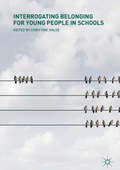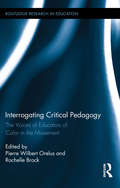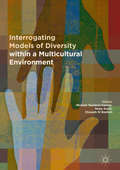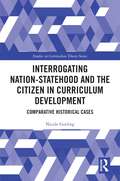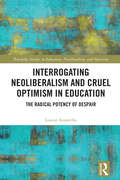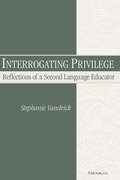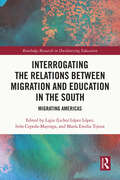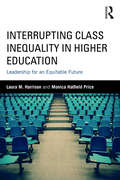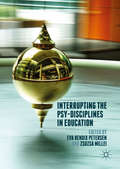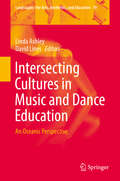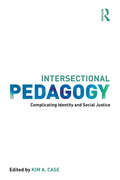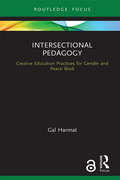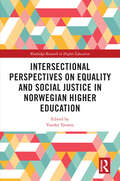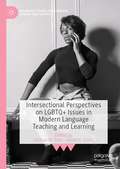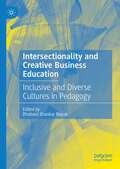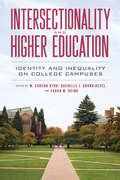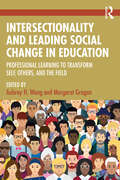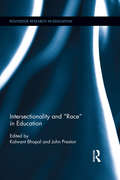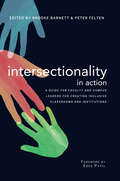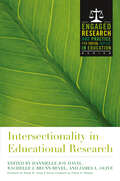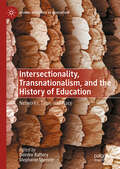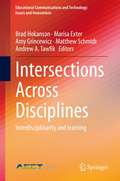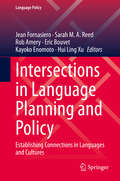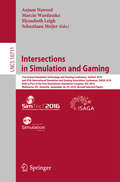- Table View
- List View
Interrogating Belonging for Young People in Schools
by Christine HalseIn an era when many young people feel marginalized and excluded, this is the first comprehensive, critical account to shed new light on the trouble of ‘belonging’ and how young people in schools understand, enact and experience ‘belonging’ (and non-belonging). It traverses diverse dimensions of identity, including gender and sexuality; race, class, nation and citizenship; and place and space. Each section includes a provocative discussion by an eminent and international youth scholar of youth, and is essential reading for anyone involved with young people and schools. This book is a crucial resource and reference for sociology of education courses at all levels as well as courses in student inclusion, equity and student well-being.
Interrogating Critical Pedagogy: The Voices of Educators of Color in the Movement (Routledge Research in Education)
by Pierre Wilbert Orelus Rochelle BrockEducators, teacher practitioners, and social activists have successfully used critical pedagogy as a tool to help marginalized students develop awareness and seek alternative solutions to their poor educational and socioeconomic situations. However, this theory is often criticized as being mostly dominated by privileged white males, bringing issues of race and gender to the forefront. This volume provides insight on how critical pedagogy can be helpful to scholars and teachers alike in their analysis of racial, gender, linguistic and political problems. It features a wide range of respected scholars who examine the way and the degree to which critical pedagogy can be used to improve education for students of color, women and other marginalized groups.
Interrogating Models of Diversity within a Multicultural Environment
by Michael Tonderai Kariwo Neda Asadi Chouaib El BouhaliDiscussing common understanding of the concepts of multiculturalism, diversity, and inclusion, this volume critically examines the interpretation and praxis of diversity and inclusion in relation to marginalized populations—from women, sexual minorities, minority newcomers, and aboriginal communities. The contributors collected here present well-grounded epistemological, theoretical, and methodological bases from which to account (at least in part) for the processes and dynamics shaping the relationship between diversity and inclusion, on the one hand, and policy and practice on the other. Arising from research derived in part from community work with minorities in North America, particularly Canada, this volume examines common barriers to full minority integration, with important implications for inclusion efforts around the globe.
Interrogating Nation-Statehood and the Citizen in Curriculum Development: Comparative Historical Cases (Studies in Curriculum Theory Series)
by Nicole GotlingThis book dives into the histories of nation-state-building and curriculum formation to explore the ways that they intertwine, form and inform each other.This book follows the understanding that nation-states have – and still do – develop their educational institutions, curricula, and teaching materials with specific goals and with a specific idea of the ideal student and citizen they want to create in mind. In particular, it advocates that analyzing multiple, idiosyncratic cases can inform the connection between what we learn, how we learn it, and who we become as citizens and further, that this is related not to linear or global phenomena, but to particular nation-states, curricula, and time periods. This book focuses on the comparison between four cases during the time of the large, map-changing events and period of the Prussian Wars (1864–1871) to make the intertwined relationships between nation-states and their curricula, designed to create future loyal citizens, more apparent. It makes a point of reconstructing each of the nation-states' historical national-political and educational processes, and then the reconstructed trajectories are compared both in their own trajectories over time throughout the 19th century and up until World War II and in relation to other nation-states' trajectories over the same long timespan.Exploring a new pathway into research on the intersection of education, curriculum, and nationalism and providing a new, extensively researched and formed methodological framework, it will appeal to researchers, academics, and postgraduates with interests in comparative and international education, curriculum studies, the history of education, nationalism, state-building, and textbook analysis.
Interrogating Neoliberalism and Cruel Optimism in Education: The Radical Potency of Despair (Routledge Studies in Education, Neoliberalism, and Marxism)
by Louise AzzarelloThis book is a philosophical examination of the ways in which neoliberalism underpins and impedes public education. It proposes that education’s adoption of neoliberal logic generates a sense of despair amongst educators, who often enter the profession with the hope of building a better, more just world.Drawing on the author’s 27 years of experience as a secondary classroom teacher and engaging with a range of theoretical concepts, cultural objects, and scenes of violence from her time in the classroom, The Radical Potency of Despair renders visible the ongoing harms that neoliberal logic creates for education and educators. The author proposes a new “ruptured fantasy of education” and suggests that it is not hope that ignites educators who keep fighting for education, but rather despair. Despair is conceived of as a generative force, provoking educators to hold time and space open for pedagogical encounters that interrupt the ongoing instrumentalization of education. The author further conceptualizes a notion of thinking with images as a pedagogical interruptive force. Thinking with images, she argues, gives students time and space to attend to what they see, thus affording them the chance to think differently about the violence of modern society. Such pedagogical interruptions are presented as a refusal of the normative order of education, countering present infrastructures that aim to constrain and instrumentalize education.A compelling and original volume, it will appeal to scholars, researchers, and upper-level students with interests in neoliberalism and education, the philosophy of education, critical pedagogy, and educational policy and politics.
Interrogating Privilege: Reflections of a Second Language Educator
by Stephanie VandrickInterrogating Privilege is a welcome combination of personal essays and academic research, blending theory, analysis, and narrative to explore the function and consequences of privilege in second language education. While teachers’ focus on the learning process and class goals are quite important, there is not enough attention paid to the types of privilege—or lack thereof—that individuals bring to the classroom. Through chapters that can either stand alone or be read together, with topics such as gender, age, and colonialism (the author is the daughter of missionary parents) in second language teaching, this book seeks to address the experiences of teachers, scholars, and students as “whole persons” and to observe the workings of identity and privilege in the educational setting.
Interrogating the Relations between Migration and Education in the South: Migrating Americas (Routledge Research in Decolonizing Education)
by Ligia Licho López López Ivón Cepeda-Mayorga María Emilia TijouxAdopting a uniquely critical lens, this volume analyzes the relationship between forced migration, the migrations of people, and subsequent impacts on education. In doing so, it challenges Euro-modern and colonial notions of what it means to move across 'borders'. Using Abiayala and its diasporas as theory and context, this volume critiques dominant colonial attitudes and discourses towards migration and education and suggests alternatives for understanding how culturally grounded pedagogies and curricula can support migrating youth and society more broadly. Chapters use case studies and first-hand accounts such as testimonios from a variety of countries in the Global South, and discuss the lived experiences of Afro-Colombian, Haitian, and Indigenous youth, among others, to challenge the rigid disciplinary borders upheld by Euro-modern epistemologies. This text will benefit researchers, academics, and educators with an interest in international and comparative education, multicultural education, and Latin American and Caribbean studies more broadly. Those specifically interested in anticolonial education, diaspora studies, and educational policy and politics will also benefit from this book.
Interrupted: A Life Beyond Words
by Rachel CokerThe nightmares of caring for a terminally-ill mother have taken their toll on fourteen-year-old Allie Everly, and being orphaned then adopted and sent across the country during the Great Depression have nurtured the seeds of bitterness in her heart. After blaming her best friend, Sam, for her mother’s death, she is suddenly confronted by a new mother, a new family, and new circumstances. Time after time she rejects those who try to reach out to her, caught up in her own self-pity and longings. But when Sam appears four years later, Allie must confront not only who she has become, but a host of confusing emotions. After years of pushing people out, can Allie finally find forgiveness and comfort in God, and open her heart to the healing powers of love and family?
Interrupting Class Inequality in Higher Education: Leadership for an Equitable Future
by Laura M. Harrison Monica Hatfield PriceInterrupting Class Inequality in Higher Education explores why socioeconomic inequality persists in higher education despite widespread knowledge of the problem. Through a critical analysis of the current leadership practices and policy narratives that perpetuate socioeconomic inequality, this book outlines the trends that negatively impact low- and middle-income students and offers effective tools for creating a more equitable future for higher education. By taking a solution-focused approach, this book will help higher education students, leaders, and policy makers move from despair and inertia to hope and action.
Interrupting the Psy-Disciplines in Education
by Zsuzsa Millei Eva Bendix PetersenThis book offers critical explorations of how the psy-disciplines, Michel Foucault's collective term for psychiatry, psychology and psycho-analysis, play out in contemporary educational spaces. With a strong focus on Foucault's theories, it critically investigates how the psy-disciplines continue to influence education, both regulating and shaping behaviour and morality. The book provides insight into different educational contexts and concerns across a child's educational lifespan; early childhood education, inclusive education, special education, educational leadership, social media, university, and beyond to enable reflection and critique of the implications of psy-based knowledge and practice. With chapters by a mixture of established and emerging international scholars in the field this is an interdisciplinary and authoritative study into the role of the psy-disciplines in the education system. Providing vivid illustrations from throughout the educational lifespan the book serves as an invaluable tool for reflection and critique of the implications of psy-based practice, and will be of particular interest to academics and scholars in the field of education policy and psychology.
Intersecting Cultures in Music and Dance Education
by David Lines Linda AshleyThis volume looks forward and re-examines present day education and pedagogical practices in music and dance in the diverse cultural environments found in Oceania. The book also identifies a key issue of how teachers face the prospect of taking a reflexive view of their own cultural legacy in music and dance education as they work from and alongside different cultural worldviews. This key issue, amongst other debates that arise, positions Intersecting Cultures as an innovative text that fills a gap in the current market with highly appropriate and fresh ideas from primary sources. The book offers commentaries that underpin and inform current pedagogy and bigger picture policy for the performing arts in education in Oceania, and in parallel ways in other countries.
Intersectional Pedagogy: Complicating Identity and Social Justice
by Kim A. CaseIntersectional Pedagogy explores best practices for effective teaching and learning about intersections of identity as informed by intersectional theory. Formatted in three easy-to-follow sections, this collection explores the pedagogy of intersectionality to address lived experiences that result from privileged and oppressed identities. After an initial overview of intersectional foundations and theory, the collection offers classroom strategies and approaches for teaching and learning about intersectionality and social justice. With contributions from scholars in education, psychology, sociology and women’s studies, Intersectional Pedagogy include a range of disciplinary perspectives and evidence-based pedagogy.
Intersectional Pedagogy: Creative Education Practices for Gender and Peace Work (Routledge Research in Educational Equality and Diversity)
by Gal HarmatIntersectional Pedagogy: Creative Education Practices for Gender and Peace Work teaches educators to use innovative learning methods to encourage students to rethink culture, gender, race, sexual orientation, and social class with a deep awareness of accessible language as a means of communication across disagreements. With a focus on emancipatory critical pedagogy, as well as tools to promote sustainable peace and human rights advocacy, the book's main objective is to examine and present methods that can help students address rapidly changing social situations. Recent developments under discussion include the #MeToo and #WhyIDidntReport campaigns to counter sexual violence, campaigns to support refugees and migrants, and other human rights issues. The book examines how theory can be translated into practice and how various dilemmas pertaining to young people navigating a changing world can be successfully addressed in the classroom. This book is an ideal reading for researchers and postgraduate students in education. It is written for practitioners in peace education and for those within traditional and alternative academia who wish to promote intersectional awareness in their teaching.
Intersectional Perspectives on Equality and Social Justice in Norwegian Higher Education (Routledge Research in Higher Education)
by Vander TavaresHighlighting how systemic inequities in Norwegian higher education are perpetuated through colonial legacies, monocultures of knowledge, and a lack of critical engagement, this book offers an intersectional analysis that identifies issues and complexities in the domains of pedagogy, epistemology, research, curriculum, and support services.Foregrounding the voices of researchers, teacher educators, and student teachers through a variety of methodological approaches, the volume examines and critiques interconnected barriers rooted in experiences and ideologies of class, gender, sexual orientation, race, ethnicity, body, language, literacy, and religion that marginalize students and scholars, particularly those with multiple minority identities. Chapters identify persistent gaps in policy and practice in the experiences of students and scholars, including those from the Global South, despite growing equity, diversity, and inclusion mandates and discourses promoted by Norwegian higher education. To address such challenges, this volume advocates for decolonization, pluriversality, and systemic changes in higher education and academic practices through intersectionality to create a more inclusive and equitable higher education landscape.Advocating for the need to ethically humanize, diversify and decolonize Norwegian higher education, this book will be of interest to researchers, scholars and postgraduate students in the fields of higher education, multicultural education, and sociology of education. Policymakers and administrators may also benefit from the volume.
Intersectional Perspectives on LGBTQ+ Issues in Modern Language Teaching and Learning (Palgrave Studies in Language, Gender and Sexuality)
by Joshua M. Paiz James E. CodaThis edited book examines how sexuality and sexual identity intersect and interact with other identities and subjectivities – including but not limited to race, religion, gender, social class, ableness, and immigrant or refugee status – to form reinforcing webs of privilege and oppression that can have significant implications for language teaching and learning processes. The authors explore how these intersections may influence the teaching of different languages and how pedagogies can be devised to increase equitable access to language learning spaces. They seek to open the conversation on intersectional issues as they relate to sexuality and language teaching and learning, and provide a conversational space where readers can engage with the notion of intersectionality. This book will be of interest to students and scholars of applied linguistics and language education, gender and LGBTQ+ studies, and sociolinguistics, outlining possible future directions for intersectional research.
Intersectionality and Creative Business Education: Inclusive and Diverse Cultures in Pedagogy
by Bhabani Shankar NayakCreative Business Education is emerging rapidly to address the needs of the creative industries including digital media, journalism, advertisement, music, marketing, films, fashion and sports business etc. Inclusive educational praxis, decolonial knowledge traditions and diverse curriculums are central to egalitarian economic development and human empowerment. As such, this edited volume explores how creative business education specifically can help to build a more diverse and inclusive environment for an increasingly diverse body of students and faculty. It discusses how students can be encouraged to succeed and excel, reflecting on the need for academic pedagogies to embrace greater inclusivity for diverse cultures. Advancing different theoretical trends within intersectionality and the limits of its praxis, contributors deal with different forms of inequalities based on class, gender, race, religion and belief, sexual orientation, and disabilities in teaching and learning. It is important to articulate and outline the critical lineages of intersectionality within creative business education and its progressive potentials for pedagogical transformation.
Intersectionality and Higher Education: Identity and Inequality on College Campuses
by Terry-Ann Jones Elizabeth M. Lee Sarah M. Ovink W. Carson Byrd Derrick R. Brooms Rachelle J. Brunn-Bevel Antron D Mahoney Marcela G. Cuellar R. Nicole Johnson-Ahorlu Deborah M. Warnock Kristen A. Clayton Victor E. Ray Tonya Maynard Denise Goerisch Bedelia N. Richards Melanie Jones Gast Ervin Maliq Matthew Orkideh Mohajeri Fernando Rodriguez Finn Schneider Ophelie Rowe-Allen Meredith Smith Tonisha B. Lane Annemarie Vaccaro Ezekiel Kimball Megan Nanney Susan V. IversonThough colleges and universities are arguably paying more attention to diversity and inclusion than ever before, to what extent do their efforts result in more socially just campuses? Intersectionality and Higher Education examines how race, ethnicity, class, gender, sexuality, sexual orientation, age, disability, nationality, and other identities connect to produce intersected campus experiences. Contributors look at both the individual and institutional perspectives on issues like campus climate, race, class, and gender disparities, LGBTQ student experiences, undergraduate versus graduate students, faculty and staff from varying socioeconomic backgrounds, students with disabilities, undocumented students, and the intersections of two or more of these topics. Taken together, this volume presents an evidence-backed vision of how the twenty-first century higher education landscape should evolve in order to meaningfully support all participants, reduce marginalization, and reach for equity and equality.
Intersectionality and Leading Social Change in Education: Professional Learning to Transform Self, Others, and the Field
by Margaret Grogan Aubrey H. WangThis book explores a social change and transformational approach to leadership. As educational leaders are increasingly serving a changing demographic of students and also address persistent challenges and heightened tension around race and equity, it is becoming necessary for educators to approach leadership in new and radical ways.Designed for aspiring and current leaders, this book highlights stories of courageous educational leaders with intersectional identities who interrogate and reflect on how their intersectionality shaped their leadership. In turn, these stories help readers explore how lived experiences and deeply held values can shape and inform their own leadership. Chapters conclude with a reader’s guide, prompting reflection upon the nuances of each leader’s journey, and thus, facilitating the discourse of marginalized experiences in educational leadership.This new approach to professional learning helps today’s aspiring principals, aspiring superintendents, and practicing administrators learn how intersectional leadership can help them navigate multiple marginalized spaces and codify new notions of power and success. This volume generates a collection of compelling counter narratives that the field needs to hear.
Intersectionality and Race in Education (Routledge Research in Education)
by Kalwant Bhopal and John PrestonEducation is a controversial subject in which difficult and contested discourses are the norm. Individuals in education experience multiple inequalities and have diverse identifications that cannot necessarily be captured by one theoretical perspective alone. This edited collection draws on empirical and theoretical research to examine the intersections of "race," gender and class, alongside other aspects of personhood, within education. Contributors from the fields of education and sociology seek to locate the dimensions of difference and identity within recent theoretical discourses such as Critical Race Theory, Judith Butler and ‘queer’ theory, post-structural approaches and multicultural models, as they analyze whiteness and the education experience of minority ethnic groups. By combining a mix of intellectually rigorous, accessible, and controversial chapters, this book presents a distinctive and engaging voice, one that seeks to broaden the understanding of education research beyond the confines of the education sphere into an arena of sociological and cultural discourse.
Intersectionality in Action: A Guide for Faculty and Campus Leaders for Creating Inclusive Classrooms and Institutions
by Peter Felten Brooke BarnettColleges and universities silo diversity and inclusion by creating specific courses to address them, or programs to welcome and support people with a range of identities, whereas in reality students, faculty and staff do not encounter diversity in the fractured ways that match the organizational structures of our institutions. We all simultaneously embody a variety of identities with different saliency in different circumstances and times.This book offers models for institutions to move intentionally toward intersections – of study abroad and multiculturalism, of race and gender and religion, and of other essential aspects of our educational programs and our students’ identities – to open doors to new possibilities that better prepare our students for life in a diverse world, and that allow our institutions to become more efficient and effective as we strive to not simply do things better in our own separate spheres, but to do better things by working together across difference.Each chapter offers action-oriented analysis focusing on particular campus intersections, rather than attending to specific demographic groups. Chapter authors also build on their own local expertise of doing this work on campuses that often do not have deep pockets or rich histories of such efforts.The book is organized into three sections:* People focuses on diversity broadly defined, considering questions about how we recruit and engage the students, faculty, and staff in the campus community, and how we work with governing boards and others to promote inclusive excellence.* Environment focuses on inclusion, including residence life, the local community, the working and learning environment, and external factors and events such as national and international news or town gown relationships.* Learning focuses on perspective taking and learning about difference in the core curriculum, the disciplines, and the co-curriculum, as well as professional development for faculty and staff.This ground reaking book helps readers, no matter what position they occupy on campus, to develop the knowledge and capacities necessary to create inclusive classrooms and is premised on the understanding that identity, oppression, power and marginalization cannot be addressed by looking solely at single identities.
Intersectionality in Educational Research
by Dannielle Joy Davis Rachelle J. Brunn-Bevel James L. OliveThe purpose of this work is to advance understanding of intersectional theory and its application to research in education. The scholars whose work appear in this volume utilize intersectional theory and research methods to work in fields and disciplines such as Education, Sociology, Women’s Studies, Africana Studies, Human Development, Higher Education Administration, Leadership Studies, and Justice Studies. The book illustrates how intersectional theory can be used in both quantitative and qualitative education research on college student access and success, faculty satisfaction and professional development, and K-12 educational issues such as high school dropouts and bullying. This book is unique, as no other book ties intersectionality to the research process.Key Features:* Readers will learn the basic tenets of intersectionality and how it can be useful in education research.* Readers will learn how intersectionality can be used to analyze both quantitative (large scale survey) and qualitative (interview, participant observation, and ethnographic) data.* Lastly, readers will learn how intersectionality can be particularly useful in examining the experiences of diverse groups of students attending elementary schools, high schools, colleges and universities, and faculty working at post-secondary institutions.Intersectionality is increasingly being used in research and education. This theory holds great promise in exploring students’ experiences in terms of access, success, and outcomes for marginalized groups. In essence, application of the theory promotes critical complex thinking regarding the intersectionality of race, class, and gender and their outcomes.
Intersectionality, Transnationalism, and the History of Education: Networks, Time, and Place (Global Histories of Education)
by Deirdre Raftery Stephanie SpencerThis volume brings together a diverse range of contributors to explore the significance of intersectionality and transnationalism, with reference to the history of education. The chapters cover a range of educational spaces and places and demonstrate the possibilities that theoretical approaches can offer to scholars at all levels of their academic career. The chapters focus specifically on women’s activism in order to maintain a coherent framework of research that is brought together in an introduction and concluding thoughts. The significance of gender as relational and a symbol of power ensures that men and masculinities are not overlooked but recognized as integral to understanding gender dynamics as they affected women’s education and the ways in which that education took place.
Intersections Across Disciplines: Interdisciplinarity and learning (Educational Communications and Technology: Issues and Innovations)
by Brad Hokanson Andrew A. Tawfik Amy Grincewicz Matthew Schmidt Marisa ExterThis volume is the result of the annual Summer research symposium sponsored by the Association for Educational Communications and Technology (AECT). The twenty-two chapters in this volume seek to examine how learning and the design of instruction is interdisciplinary and connective in terms of research and practice. The book is generally divided into three areas: Theory, Research, and Application. This framework shaped the authors’ interactions, discussions, and the informal context of the symposium. Writings are included on multiple levels including research and practice on learning across disciplines, including instructional design and how design thinking is inherently interdisciplinary. How learning is designed for general audiences or for purposely integrated educational experiences has also been examined.
Intersections in Language Planning and Policy: Establishing Connections in Languages and Cultures (Language Policy #23)
by Hui Ling Xu Jean Fornasiero Sarah M. A. Reed Rob Amery Eric Bouvet Kayoko EnomotoThis volume encompasses the range of issues encountered by language scholars who teach and research in departments of languages and cultures within the higher education system, predominantly in Australia, but touching other universities worldwide. Related studies on language planning, methodology or pedagogy have focused on one or more of these same issues, but rarely on their totality. Intersections as a metaphor running discreetly through the essays in this volume, connects them all to a lived reality. The field of languages and cultures, as it is practised and reflected upon in Australian universities, is essentially an interdisciplinary and interconnecting space - one in which linguistic and disciplinary diversities meet and join forces, rather than collide or disperse along different pathways. The international and local studies featured here focus on language planning, new pedagogies and language reclamation and link to meeting points and commonalities. They show that language scholars are increasingly finding themselves on common ground as they tackle issues of policy and practice affecting their field, whether within their institutions, within the tertiary system, or within the framework of government policy.
Intersections in Simulation and Gaming: 21st Annual Simulation Technology And Training Conference, Simtect 2016, And 47th International Simulation And Gaming Association Conference, Isaga 2016, Held As Part Of The First Australasian Simulation Congress, Asc 2016, Melbourne, Vic, Australia, September 26-29, 2016, Revised Selected Papers (Lecture Notes in Computer Science #10711)
by Anjum Naweed Marcin Wardaszko Elyssebeth Leigh Sebastiaan MeijerThis book constitutes the refereed post-conference proceedings of the 21st Annual Simulation Technology and Training Conference, SimTecT 2016, and the 47th International Simulation and Gaming Association Conference, ISAGA 2016, Held as Part of the First Australasian Simulation Congress, ASC 2016, held in Melbourne, VIC, Australia, in September 2016. The 28 revised full papers included in the volume were carefully reviewed and selected from 55 submissions. They are organized in the following topical sections: Making the grade; Come to think of it; From here to fidelity; The name of the game; and Ahead of the game.
